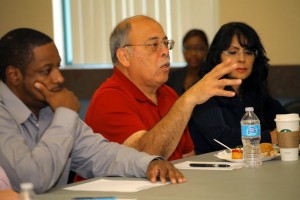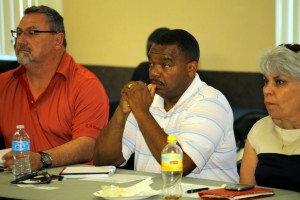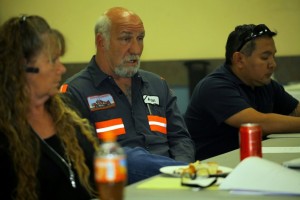SAN BERNARDINO – Assemblymember Cheryl R. Brown (D-San Bernardino) recently convened a roundtable meeting at the Gonzales Center in Colton to discuss transportation challenges facing transport, freight and logistics industry professionals in the 47th Assembly District.
Participating agencies included: C.R. England, Patriot Towing, the California Trucking Association, Union Pacific, A-2-Z Emissions Solutions, Colton Planning Dept., Center for Employment Training, Rail and Delivery Service, IE Corridor Transport Inc., The Complete Logistics Company, and Ashley Furniture.
The meeting began with a warm welcome by Mayor Richard DeLaRosa on behalf of the Colton City Council. Thereafter, Assemblymember Brown provided an introduction.
“Trucking and logistics is the most important component of our local economy,” said Assemblymember Brown. “According to recent news reports, the logistics sector, which is warehousing, distribution and trucking, produced one out of every five jobs last year in the Inland Empire. It’s really important that it remains robust because that’s where the majority of jobs are created.”
Following introductions, Assemblymember Brown presented a legislative update on various bills that she introduced to address transportation issues and promote job growth.
She mentioned AB 914, a bill that would allow Caltrans to construct a toll lane on the I-10 and I-15 freeways. “As you know, our roads need to be repaired. One of the ways that we can repair our roads is by considering High Occupancy Toll (HOT) lanes. The funds obtained by the tolls would go directly toward maintaining, repairing and creating new lanes in the Inland area on the I-10 and I-15 freeways in San Bernardino County,” she said.
Last week, AB 914 passed out of the Assembly Committee on Transportation and now moves to the Appropriations Committee.

Mayor Pro Tem Frank Navarro shares his concerns regarding transportation in the Inland Empire. He’s seated next to Colton Planning Commissioner Rosa Granado-Dominguez and Terrill Grant, a
She also spoke about AB 1445 and AB 1302, which seek to improve economic opportunities for small businesses and disabled veteran-owned businesses relevant to contracting with the state.
Following her legislative address, various industry professionals spoke about the impact of AB 32 on their individual companies.
According to several participants, retrofitting the trucks to make them compliant with AB 32’s standards presents a great challenge. “Having to put their money into their trucks to make them efficient for the emissions requirements is going to increase the price of goods and services, which is really going to hurt the Inland Empire,” said Colton Planning Commissioner Rosa Granado-Dominguez.
Arlan White, a member of the Towing Regulatory Oversight Council and past board member of the California Tow Truck Association explained that upgrading the trucks are extremely expensive. “The typical cost of a California Air Resources Board (CARB) compliant retrofit is $10,000 to $20,000 per truck. The purchase price of a new CARB compliant truck typically ranges between $100,000 up to half a million dollars,” he said.
Most trucking companies have to change their equipment every few years to stay compliant in California. On top of that, lack of personnel makes it very difficult to enforce the law, which creates unfair competition, according to a number of participants.
“Truckers are spending millions of dollars to keep up with CARB, but there’s minimal enforcement for those are who are not compliant with the law. They’re coming in and undercutting local businesses that have spent the money to retrofit their trucks,” said Tiffany Gallaway, a representative of the California Trucking Association.
“On average, drivers are on the road for 7-14 days. However, to make up for the cost of retrofitting their trucks, drivers are out there 20-25 days, which takes away time from their families. For a lot of people, trucking is their livelihood; it’s what puts dinner on the table. The cost of overreaching regulations is restricting the productivity and income that a single driver can make,” said

Glen Taylor, C.R. England Global Transportation; Melvin Maclin, C.R. England Global Transportation; Lupe Valdez, Union Pacific
Arthur Jones, owner of IE Corridor Transport, Inc.
Also in attendance was Colton Mayor Pro Tem Frank Navarro, a board member of the Southern California Association of Governments (SCAG). He said, “I think what we need to do is go back to Washington and Sacramento and look at this over-regulation. How can we soften these regulations to allow, not only the big corporations, but also the little guy to become compliant.”
“In partnership with the trucking community, Union Pacific sees the impact of AB 32’s regulations on our partners,” said Lupe Valdez, a representative of Union Pacific. “It’s important for trucking companies to be involved in the policy making process to avoid unintended consequences.”
Other topics raised during the discussion included freight movement at the LA and Long Beach Ports, adjusting to diesel fuel prices and increased taxes for truck drivers.
A follow up to this roundtable will be a Trucking Summit held by Assemblymember Brown in September 2015. The Summit will focus on solutions to the challenges outlined during the roundtable. Details are forthcoming.
For more information, contact Ashley Jones at (909) 381-3238.
 Westside Story Newspaper – Online The News of The Empire – Sharing the Quest for Excellence
Westside Story Newspaper – Online The News of The Empire – Sharing the Quest for Excellence






